Today we returned to Houla. From the village you can see the border with Israel. High on the hilltop you can see the Israeli surveillance towers. Israeli snipers fired on the village throughout the war. Bullet holes from a large caliber gun lined the exterior walls of the homes facing the hill. I was told the Israeli army suffered twelve deaths when ground forces tried to enter Houla. They withdrew and began shelling the village.
We met with a family who lost their mother on August 6th. The room in which she was killed faced the hillside. Each day she would make bread for her family who lived next door. Clearly the snipers watched this woman each day as she entered her kitchen. On the day she was killed she entered the kitchen as usual. A tank mortar followed closely behind her. Her brother tried to recover her body but was trapped in the room by the snipers for several hours, and finally had to leave unable to recover her body. It would be several days before the snipers relented and let her body be moved. She left behind five boys and a girl as well as her husband Yasser.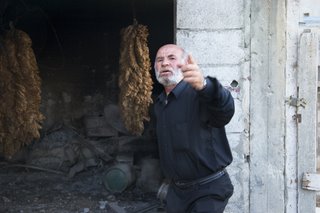
Now, Yasser stands in the doorway of the kitchen, pointing to the hillside and telling the story of his wife’s death. I realize that the Israeli army is most likely watching us from the home they still occupy high on the hillside. I wonder if a sniper has a bead on any of us. The eighteen-year-old daughter, Afaaf cheeks flush and tears well up in her eyes as her father recounts how her mom was killed. I cry too. Yasser ends by saying, “the Israeli’s killed 83 people in Houla when they created their state in 1948, and they continue to kill us today”.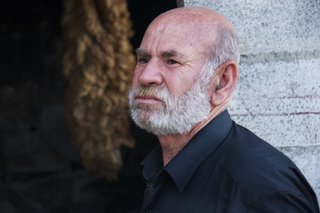
For a minute we all stand silent, then turn and climb the steps. Yasser’s neighbor, Nader beckons us to his home across the street. The home was struck by a bomb on July 15th. He invites Mohammad and I into the house. The walls of the house are all buckled outwards, but somehow the house remains standing. In the entranceway I step over curtains and a sewing machine. Broken furniture, clothes, photographs, toys and papers lie scattered on the floor. The TV remains on the shelf, it’s screen blown out by shrapnel. We climb over the wreckage. On the 3rd day of the war, July 15th, Nader was in his home having dinner with fifteen relatives. A rocket fired from an Israeli jet entered through the front door. Nader points to where his wife Zainab was killed, as well as his sister Sabna. “Right there, we were gathered, eating”, he points to the broken bowls and food that lie scattered on the floor. Nader tells us that he pulled his relatives out of the house one by one, including his seven-month-old daughter and his severely injured brother. His brother remains hospitalized. It is obvious that since the bodies were removed, nothing else has been touched. Mohammad tells me it is OK to photograph, but I can’t- it feels profane. I tell him I can’t do it, it seems like sacred space. We turn and climb through the debris back to the street. Nader invites us next door, and we join him in the sitting room. He shows us pictures of his sister and his wife. We sit quietly, not saying anything. Nader’s pain and grief are etched in his face and his eyes express a sorrow that can’t be quantified. He is crying, but without tears. He sits cracking his knuckles, and rubbing his hands. He seems unsure what to do next. We take our leave. He thanks us for coming.
Kofe Annan also came to Houla today. He did not visit the home occupied by the soldiers, he did not visit with Yasser and his daughter, nor did he step into Nader’s tableau of pain. We asked a woman if she saw him in the village. She said, “Did he bring meat? He didn’t. I don’t care about Kofi Annan, the UN has done nothing for us.”
Thursday, August 31, 2006
Return to Houla Aug 29th, 2006
Zebquine Aug 27th, 2006
Once, after a bomb destroyed an apartment building in Gaza, Dan Halutz, currently the Israeli Army Chief of Staff, was asked what it felt like to drop a large bomb on people. He replied, “I feel a light bump to the plane as a result of the bomb's release. A second later and it's gone, and that's all. That is what I feel."
Today I attended a funeral in Zebquine along with several members of the Campaign for Civil Resistance. It was for a family of 12 who died on the first day of the air attack. The family lived on the outskirts of the village, and the father thought it would be safer to stay with relatives in the center of the village for the night. The next morning, the father went outside, started the car and began collecting everyone to return home. It was a trip that would never be completed. A large bomb hit the house, leveling it.
The funeral was a somber one. In one room the men spoke of martyrdom and the impulse to resist and fight for your home, your land, and your people. To fight for what was right and just. They said that as the bombing began there were members of the community who they had never considered fighters, in the streets with weapons, willing to defend their families and property. I am certain many Americans can appreciate this reaction. It is the principle advocated by the National Rifle Association. In defending Israel, Americans are quick to retort, “What would you do if we were invaded by another country? You have the right to self-defense don’t you?” The people of South Lebanon have exactly the same impulse.
On the porch, the women spoke of the family members who were killed, and they brought out smiling portraits of each of the twelve victims.
When we left the funeral, we went to the destroyed home. It was one of dozens destroyed in the village center. A green living room set covered in grey dust sat in a corner. Everything else was a twisted pile of rubble. A child’s nightgown patterned with red hearts and the word ”love” was in the dust of the street, the pages of a book were fluttering in the breeze. The women who accompanied us explained that it took several days to dig all the victims out.
As we continued down the street, a young man surveying the rubble stopped me as I passed and began speaking rapidly in Arabic. He smiled and waited. He asked what I thought of his village. He asked me if this was right, if this devastation was somehow deserved. All I could say was, “Of course not.” He said, “What can we do?” I did not reply. He pointed to the home he had been looking at and said, "two men died there". He pointed across the road to a van crushed by a fallen home, “A school bus” he said. We turned another corner, and he picked up a school tablet, “in this house the man had three school children”, he dropped the book back in the dust.
This evening the skies are crystal clear. The Milky Way, in its majesty, drapes the sky, there are more stars than I can imagine. A shooting star races to the horizon as the crickets chirp their song. All I can think of is bombs raining down like shooting stars with sound, as Katushyas race to meet them. All I can think of is a child in a nightgown with hearts and love, whose dreams were ended in the flash of a smart bomb.
I wonder if the crickets sing as homes explode in the night? Or does the natural world bear witness to this sacrilege in silence?
Monday, August 28, 2006
Houla and Kantara Aug 26th, 2006
Houla and Kantara
Today I traveled to south Lebanon with a grassroots organization called Lebanon Solidarity. This group began organizing when the war began. The group has two main goals in the short term; the first is to get basic relief to the hard hit regions of the south, particularly the small villages that have been overlooked by the major NGO’s. The second goal is to join participants from across Lebanese society in organizing a united response to the Israeli aggression that has done so much damage throughout Lebanon.
We first traveled to Houla a village of 1500 homes, 40 of which were completely destroyed, 250 of which have significant damage. The major concern at this time is the water supply, many of the homes in the village depended on the village water supply for all their needs. The 4 main water tanks as well as the motor for the pump were the first things destroyed by Israel’s aerial bombardment. Why water? Can this possibly be a legitimate target in the “war on terror”? Or would Israel merely dismiss this as another instance of “collateral damage”? The Israeli forces hit Houla hard. The heart cannot find words or expression to what the eyes record. Home after home lie in complete and utter ruin. What can be the explanation for this destruction? Self defense? To defeat terrorism? To teach a lesson? To make a point (perhaps might makes right?) The infamous words of our President come back to haunt me, “This is an opportunity.” The hollow words of a blind man that strike me hard as I wander through the wreckage.

While assessing damage in the village, we are met by a ninety-year-old man Ahmad Hagg, who showed us his destroyed house. He was sleeping in the house when it was bombed and was lucky to get out alive. One family member died in the attack. Out in his garden an unexploded bomb lay near where he had his tobacco crop drying in the sun. He insisted over and over again that we tell the world what happened in Houla.
From Houla we journeyed to Kantara. Just 2 days earlier, and over a week into the ceasefire, Israeli soldiers kidnapped 2 residents of the village and removed them to an unknown location. I walk along the main street with fifteen-year-old Mohammad and his nine-year-old brother Ali. They invite me into the remains of their uncle’s house that has been gutted by a fire resulting from rocket fire. As we continue down the street, the boys point to cluster bombs lying in the dust by the side of the road and a landmine which has rocks piled around it to warn people to stay away. (Later that night we learn from UN coordinators that over 300 locations of unexploded ordinance had been identified to date, and many villages had not yet been reached due to security concerns.)
Cluster bombs pose a particularly deadly post war threat. Up to 25% of the canisters do not explode when they hit the ground. One cluster bomb holds dozens of bomblets that disperse over a wide area. Each bomblet is small and inconspicuous. If you find one unexploded cluster bomb on the ground, you can expect there are many more in the vicinity. If a child were to kick one, or try to pick one up, it is very likely to explode, sending shrapnel in all directions. I ask Mohammad about the danger and he tells me many parents are keeping their children indoors until Unifil arrives and clears the area. I ask him, “Why are you and your brother outside?” and we all share a laugh. With such a backlog of locations, it may be weeks before the streets of Kantara are safe for children. In the US media we continually hear analysts report on how Hizbullah has munitions loaded with ball bearings in order to maim and kill as many civilians as possible, and Israel uses precision guided weaponry to avoid civilian casualties. On the ground in Lebanon this myth is easily exploded. Since the end of the war thirty-eight civilian casualties have been reported due to the detonation of cluster bombs, and these numbers are growing everyday. The cluster bombs are American products, like most of the weaponry used to destroy Lebanon.
Everywhere, Hizbullah flags are flying. Photos and posters of Sheik Nasrallah are everywhere. Outrage over Israel’s destruction of infrastructure and against the civilian population was palpable. Whatever the dynamics involved in attempting this misadventure, whether it was pressure from the US, or attempts of the new Israeli government to “prove itself”, or retaliation for the capture of two Israeli soldiers, it was a huge miscalculation. From all appearances on the ground, Hizbullah has gained wide spread support not only for the resistance but for the practical and timely measures taken since the ceasefire took effect.
One can only wonder what measures Israel will consider next, now that Hizbullah is even stronger than before the bombing began.
Thursday, August 24, 2006
Made in the USA
South Beirut, August 24th, 2006
Before I left for Beirut, a friend said, “I’d like to support you, but I ask you to not forget about the Israeli victims.” I have not forgotten them. Over the years I have been called one sided in my condemnation of Israeli policies, and American support and encouragement of these policies. It is not because I don’t care about Israeli victims. I criticize these policies because they cannot lead to peace, but only lead to more death and destruction. These failed policies can be seen strewn throughout the Middle East from Afghanistan to Iraq to Palestine and Lebanon. In all of these areas “the war on terror” has led to violence that is unprecedented and shows no signs of abating. As talk of striking Syria and Iran increase, the threat to civilian populations across the Middle East increases as well.
Today I traveled to South Beirut, an area heavily hit by Israeli warplanes. The destruction was devastating, entire city blocks reduced to rubble. The recovery is already in full swing with bulldozers clearing debris and people doing what they can to salvage their homes and businesses. It seemed as if many people were still in a state of shock, just standing in front of the piles of rubble, staring as bulldozers clawed at the remains of their homes. There were posters everywhere, proclaiming in English as well as Arabic, ”made in the USA”, and “Extremely precise targets.” I was amazed, as I always am, that no animosity was directed toward me as I photographed the destruction caused by American made bombs and weapons, and the direct result of American foreign policy. Instead, people said to me, “show these pictures when you go home, show the people what your “smart” bombs do.”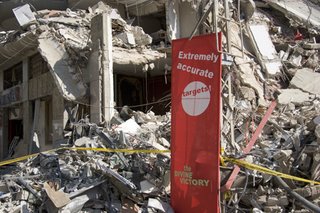
As I walked through the rubble, I had a strong sense of déjà vu, but couldn’t quite place it. I was reminded of many scenes from the West Bank, the cities of Jenin, Qaladia, Ramallah, Bethlehem, Beit Sahour, and Nablus have all suffered this kind of destruction. I was also reminded of walking through the Gulf Coast region destroyed by hurricane Katrina, but that was not it either. Then it struck me- the smells, the pulverized concrete, the empty shoe lying in the dust, the battered child’s toy, the bystanders in small groups conversing quietly or just watching. I was once again standing in the dust of the World Trade Center. As the 5th anniversary of that disaster quickly approaches, I thought about the multitude of 9-11’s perpetrated on Middle Eastern countries in the name of “self defense” or the “war on terror” since 2001. But this is not the first time Lebanon has suffered this kind of destruction. The influx of the PLO in the late 60’s, decades of cross border raids by Israel, a bloody civil war, years of Israeli occupation, the formation of Hizbullah in the early 80’s to counter the occupation, and the current crisis- it seems like 9-11’s are a regular, if unwelcome, guest in this part of the world.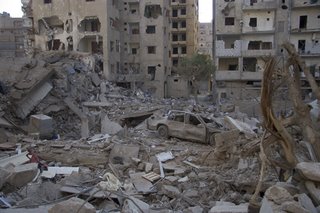
Walking through block after block of destroyed apartment complexes I felt outraged and grief stricken at the scale of the destruction. How can this be? Even if you agree with the argument that rockets were fired from civilian areas and that is why they were targeted, no rockets were fired from Southern Beirut. Even if you believe the rhetoric that Hizbullah was hiding (not living, mind you!) among the civilian population, does this justify the bombing of civilian population centers? And just because Israel dropped leaflets warning people to leave the area, does this validate aerial bombardment on this scale? If Hizbullah warned the residents of Haifa to leave before bombing them, would that make it OK? Where do we draw the line, and why is our self-defense always justified, but our “enemy’s” is not? Today, Amnesty International issued a report stating that the wanton destruction of infrastructure and civilian areas was not the result of collateral damage but was in fact an integral part of Israel’s war plan. These charges as well as charges against Hizbullah demand a comprehensive and independent UN inquiry. Governments must also be held accountable for war crimes perpetrated against civilians.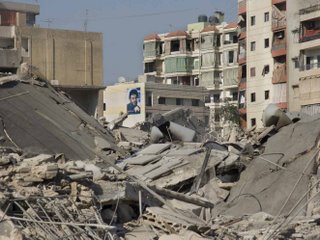
This morning I sit and recall my friends voice, I do not forget the Israeli victims, nor the Lebanese victims, but I wonder where does this all lead? When will the safety of everyone in the region hold equal value. When will each death, regardless of nationality, be one death too many?
Saturday, August 19, 2006
Letter to the US Attorney
August 18th, 2006
U.S. Department of Justice
United States Attorney
Washington, DC
Re Violation Number : P0571225
Dear Sir or Madam,
I am in receipt of your letter dated July 1st, 2006 in regards to the payment of my fine resulting from the conviction of the above referenced violation being 120 days past due. I guess at this point it is coming up to 180 days past due, and I understand from your letter that your office “will proceed with further legal action against me without notice”. I am writing to tell you that this is fine with me.
I stand accused and convicted of demonstrating without a permit. I should probably make it perfectly clear that I have absolutely no intention of paying the assessed fines, penalties, court costs, and interest.
As I discussed in court, my reasons for participating in these actions was deeply rooted in my belief in nonviolent resistance to the criminal behavior of my government. My grievances are numerous and far ranging. To recap the most egregious grievances:
• The invasion and occupation of a sovereign nation that posed no threat to our country.
• The wholesale slaughter of the Iraqi people.
• The use of white phosphorus on the people of Fallujah,
• The use of depleted uranium throughout Iraq.
• The systematic use of torture on prisoners at Abu Ghraib, at Baghdad airport and elsewhere in Iraq.
• The use of war, mayhem, and violence to drive our economy and enrich the corporate cronies of the Bush Administration.
Despite the courts decision, I was acting under the Nuremburg principles of resisting the illegal conduct of my government. This is demanded of us as citizens. The only way my government can continue pursuing these immoral agendas is with the silence and complicity of its citizens. I refuse to be silent. I refuse to be complicit. I resist the Judiciary's complicity with such criminality. I will not pay fines for illegitimate and politically motivated charges. I will not pay fines levied against me for my nonviolent activism.
I understand that such a principled stand may present a problem for you. I must state here that I am willing to go to prison for my intransigence. I also have another option to present to you. On Sunday, August 20th I will depart for Beirut. While in Lebanon I will be documenting the results of Israel’s 34 days of bombing. As you may be aware, many of the munitions used were produced by American companies. Most of the devices used to deliver these munitions were also “made in the USA”. F-16’s and Apache helicopters have come to symbolize terrorism across the region, from Iraq, Gaza, the West Bank, and now Lebanon. Upon my return I will gladly provide community service so that American citizens can see our countries contribution to “the birth pangs of a new Middle East”. I anxiously await your response to this idea.
In the mean time, please note that I have used all monies for the assessed fines, court costs, penalties, and interest to support my trip to the Middle East. I think we can all agree that this is a much more appropriate use of my funds.
Sincerely, Johnny Barber
Three Treasures Buddhist Peace Fellowship
Saturday, August 12, 2006
Thank You
Dear Friends,
In the midst of preparations for my departure to Lebanon, I wanted to take some time to thank all of you who have so generously supported me in this endeavor, both with monetary support as well as spiritual support. I will carry your messages of peace and generosity with me, not just on this trip, but always.
I will carry this generosity each step of the way, as I offer what I can to the victims of war. As is always the case, innocent people have suffered, and are suffering still. How can we even begin to measure what has happened over these past 34 days? This war, so cruelly identified as an “opportunity” by our President and a “birth pangs” by our Secretary of State, has not brought about a “new Middle East”, but only reinforced the futility of war as a means to peace. As each “side” declares victory, citizens step gingerly into the streets, avoiding the pulverized concrete and broken glass, wondering how long the ceasefire can last.
Last evening, our Zen group had a discussion on Dana paramita, the unsurpassable giving in our lives. I reflected on all that I am receiving, and how lucky and grateful I am for each thing given. I in turn, will give what I have received. Maezumi Roshi offers a second definition of Dana paramita as “giving yourself away”. He goes on to say, “As a standard of giving, we say the best thing to give is no-fear.”
So how does each of us manifest this “no-fear”? Is it not true that this “no-fear” is already manifesting each moment, in all of our lives? If so, can we avoid giving this “no-fear”?
May each step of our journey be a reminder and an example of this beautiful gift.
Peace, Salaam, Shalom.
Thank you, Johnny
Tuesday, August 01, 2006
As August Approaches
Dear Friends,
As August quickly approaches, i spend my weekends with my son at the ocean, playing hours on end in the surf, or at home behind closed doors, reading and enjoying the air conditioning as the humidity and temperatures outside reach into the 90’s. For most of July thundershowers have brought late afternoon relief, and a respite from the heat. But for me, there has been no respite from the news, and my deep misgivings of the path our country has chosen.
i have been deeply distressed, as i know you are, by the news out of Iraq, Gaza, and Lebanon. i have read endless news accounts of the suffering of civilians while the strongest armies in the world bomb, maim, and kill indiscriminately. The savagery of the attacks and the resulting mayhem has shown the true colors of our government and allies. i sit, incredulous, as our representatives continue to assert this is for the good of the Iraqi, Lebanese, and Gazan people. My disbelief hit an all time high last week, when it was reported that America rushed a fresh supply of “smart” bombs to Israel, (don’t want ‘em to run out of bombs before they’re finished killin’), and the next day announced a 30 million dollar “humanitarian” package for Lebanon- while the bombs, our bombs, were still raining down on Beirut and points south.
As this debacle continues to unfold, i have decided to return to the Middle East on August 20th. The plan, as of now, is to travel to Beirut and bear witness to the suffering of the Lebanese people. As on each of my journeys, i will listen to their stories, and offer myself in any way i can. i will stand in solidarity with the ordinary people of Lebanon who are, yet again, enduring the brunt of war.
Recently and regularly, i am asked, “What good will that do?” To this i respond, “It does good to listen, and give those who are marginalized, demonized, and isolated their voice. It does good to say in the strongest way i can, i oppose the policies of my government and our allies that so callously ignore the suffering of human beings as they pursue their disingenuous ends.” On my return home, i will share what i’ve learned through words and photos so their stories will not be forgotten or ignored.
Another question i often hear- “What about your son---he needs you?” And i remember my time in a small village just outside Jenin when an Israeli soldier purposely shot a child, not much older than my boy, in the leg. With horror and fear etched into his face, he hobbled into my arms. He, too, was my child. He, too, was my responsibility. The children of Qana, the children of Haifa, all the future generations who will inherit the poison of this violence- our responsibility. i do this work for my child as well, that he may recognize that fear, intolerance, and hatred is in each of us, but how we approach these obstacles in our life is our choice. And so he may learn: you must put your faith where you heart is.
So this letter is a request for funding in order to support this trip. On this trip i will be representing many people here at home who are not able to go themselves, and yet feel the need to do something to counter our governments destructive policies in the Middle East. Many of you are already doing enormous work with total dedication and commitment, and each of you guide me in my choices, -thank you, i am already supported greatly by the example you provide!
A final question, (recently raised by my mom, who i thank for the opportunity to clarify this!), is “What’s wrong with you, have you got a death wish?” My answer is simply “i have a life wish.” A teacher (Joan Halifax) once told me “Every moment is an opportunity to carve our heart open.” i view this journey as an opportunity for me to learn of love.
Be well, and Peace, Johnny







